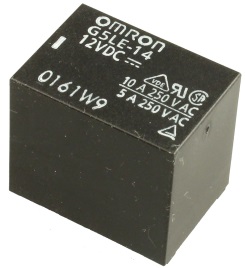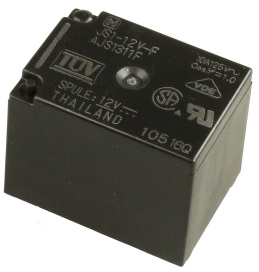Legacy Universal 1-Channel SPDT Relay Controller
Highlights
- Universal Low-Cost Relay Controller with Modular Interface
- One 5-Amp NAIS or 10-Amp Omron SPDT General Purpose Relay
- Supports USB, Bluetooth, RS-232, and Industrial Wireless Modules
- Wireless Interface Mounts as a Virtual COM Port on your PC over USB
- Easy Programming and 100% Compatibility Across ALL Operating Systems
- Turn Relay On or Off or Read Relay Status using 2-Way Communications
- Features LEDs indicates Relay Status & Overkill Transistor Drivers
- Convenient Terminal Blocks for Easy Connection
- No-Click Power-up & 2-Way Communication Capable
NCD Low-Cost Universal Relay Controllers
Whether you are looking for wireless or USB relay control, NCD universal relay controllers feature a no-frills design that supports relay on, off, and relay status commands. NCD Universal relay controllers communicate any of our communications modules that operate at 9600 baud. This relay controller features a 1-Channel 5-Amp or 10-Amp SPDT Relay with relay status LED. Power this controller using 12VDC from the 2.1mm barrel connector or the 2-wire terminal block.
Universal Interface
This Low-Cost relay controller features a modular communications interface supporting most of today’s most popular communication technologies. Choose your favorite technology now, change it later as your needs change.
Choose a USB interface for basic USB relay control using a virtual COM port communicating at 9600 baud.
Choose a Serial interface for RS-232 relay control operations at 9600 baud.
Choose a Bluetooth interface for Bluetooth relay control applications using the Virtual COM Port Driver stack.
Choose a ZigBee, 900HP-S3B, 802.15.4 interface for Wireless relay control. These options require an external that communicate to the USB port of your computer.
Choose from any of the following communication modules:
Associated Part Numbers
This product may have been previously manufactured using a part number shown below:
Relay Options

10-Amp SPDT Signal Relay Option
This controller is available with a 10-Amp relay option, allowing control of higher-power loads up to an absolute maximum of 240VAC at 10 Amps. Ideal for general purpose switching applications, this relays is focused on power-switching, and should never be used for low-power signals due to a higher On resistance of up to 150 Ohms when relay contacts are new (contact resistance drops to less than 1 Ohm after break-in period). The 10-Amp relay is of the SPDT variety, which provides Common (C), Normally Open (NO), and Normally Closed (NC) connections. Common is connected to NC when the relay is off. Common disconnects from NC and connects to NO when the relay is activated. All connections are made via screw terminals, capable of accepting up to 12 AWG wire. Review Datasheet

5-Amp SPDT Signal Relay Option
This controller is available with a 5-Amp relay option, allowing control of higher-power loads up to an absolute maximum of 240VAC at 5 Amps. Ideal for general purpose switching applications, this relays is focused on power-switching, and should never be used for low-power signals due to a higher On resistance of up to 150 Ohms when relay contacts are new (contact resistance drops to less than 1 Ohm after break-in period). The 5-Amp relay is of the SPDT variety, which provides Common (C), Normally Open (NO), and Normally Closed (NC) connections. Common is connected to NC when the relay is off. Common disconnects from NC and connects to NO when the relay is activated. All connections are made via screw terminals, capable of accepting up to 12 AWG wire. Review Datasheet
Mechanical Drawing
Wiring Diagrams
Essential
Communications
Tutorials
- Unable to Mount Virtual COM Port in Windows 10
- Controlling Inductive Devices: Managing Induction & Electromagnetic Interference
- Introduction to Computer Controlled Relays and Switching
- Relay Logic
Documentation Downloads
Download NCD Base Station
802154 RANGE
A simple demonstration of the Wireless Range of 802.15.4 in the 300′ and 1 Mile Range with and without obstacles.
Wireless Range Testing Setup
This video tells you the set up that we used to get real world ranges on our wireless communication modules.
Finding the Com Port
Learn how to find the COM Port on your windows based computer. You can also use Base Station to find the COM Port of your Relay Controller. Base Station can be downloaded at ncd.io/start.
Introduction to Relay Control
This video will guide you in determining which relay controller you need for your application as well as a general overview of the differences between Relay Options. If you’re new to our products or just need a refresher for a new application this is a great place to start.
Induction Suppression
Learn about Induction and how it comes into play with Relay Controllers. Induction suppression can make your Relay Control applications intermittent and unreliable. This video will show you what causes it, how to avoid it, and how to account for it in your application.
900HP-S3B Wireless Compatibility Notes
Notice: Compatibility Notes Does NOT Apply to the Following Products:
- NCD Enterprise Solutions
- NCD Wireless Sensors
- NCD Enterprise Modems and Gateways
Notice: Compatibility Notes Applies to NCD Industrial Products, Including Fusion, ProXR, ProXR Lite, Taralist, and Reactor Series Products.
Compatibility Notes
When using an 900HP-S3B communication module, it is essential that you use the ZIGMO_PCB to configure the module settings. Long-Range wireless sensors may be programmed over the air without removing the communications module.
A 900HP-S3B Modem or a gateway of some kind that support the 900HP-S3B communications module will also be required.
RS-232 Serial Compatibility Notes
The NCD RS-232 Serial communications module is compatible with standard RS-232 signals (+/-10VDC), which are not directly compatible with UART signals from a microprocessor. If you are working with Arduino, Microchip PIC, or other common microcontroller, a communications module is not required. Microcontrollers will directly talk to the on-board processor of all NCD controllers.


